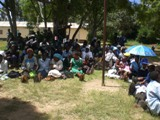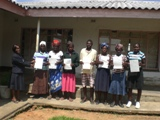Networking Leads to More Children in School
In 2010, Firelight partner Chiedza Community Based Orphan Welfare Organization found that many children living in rural Zimbabwe did not have birth certificates. This meant they were unable to benefit from government programs. So Chiedza initiated a birth registration program in 15 villages.
They started by mobilizing the community. School administrators helped to identify children without birth certificates, whose families were invited to community meetings to learn how they could obtain certificates for their children. The district office in charge of registration spoke at one of their meetings to provide more information and encourage families to register their children. Chiedza later followed up with families to assist them with transportation to the district office.
Since then, Chiedza has helped over 100 children acquire birth certificates. During this process, 73 adults also obtained their own identification documents. They are now equipped to obtain birth certificates for their children as well. These 173 people now have the legal documentation needed to access essential education and government services, and to defend their rights when needed.
Now that children have birth certificates, they can apply for Basic Education Assistance Module (BEAM), the nationally funded education assistance program. Since Chiedza has a positive reputation in the area and respect among local authorities, they knew that children in their 15 villages of operation would have a better chance of being considered for support if they lobbied the government on their behalf. Chiedza wrote to the Ministry of Education on behalf of vulnerable children in their community to be considered for BEAM. The Ministry of Education listened and now more than 60% of children in their community have been considered for educational assistance. Chiedza is continuing to work with community stakeholders, with the goal to ensure all children in their community obtain birth certificates.
Children are now able to participate in formal sporting activities and take necessary state exams to continue their education. In their words, “children felt much empowered by owning identity documents.”Chiedza’s success stems from their ability to work across sectors of the community, collaborating with caregivers, school administrators, community leaders, and the District Registrar’s office.



